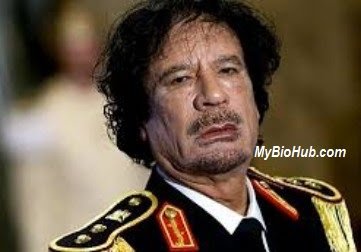Muammar Mohammed Abu Minyar Gaddafi was born in 1942 near Qasr Abu Hadi, a rural area outside the town of Sirte in the deserts of Tripolitania, western Libya. His family came from a small, relatively un-influential tribal group called the Qadhadhfa, who were Arabized Berber in heritage. His mother was named Aisha (died 1978), and his father, Mohammad Abdul Salam bin Hamed bin Mohammad, was known as Abu Meniar (died 1985); the latter earned a meagre subsistence as a goat and camel herder. Nomadic Bedouins were illiterate and kept no birth records.
He was commonly known as Colonel Gaddafi, was a Libyan revolutionary, politician, and political theorist. He governed Libya as Revolutionary Chairman of the Libyan Arab Republic from 1969 to 1977, then as the “Brotherly Leader” of the Great Socialist People’s Libyan Arab Jamahiriya from 1977 to 2011. He was initially ideologically committed to Arab nationalism and Arab socialism, but later came to rule under his own Third International Theory.
Gaddafi transformed Libya into a new socialist state called a Jamahiriya (“state of the masses”) in 1977. He officially adopted a symbolic role in governance but remained head of both the military and the Revolutionary Committees responsible for policing and suppressing dissent. During the 1970s and 1980s, Libya’s unsuccessful border conflicts with Egypt and Chad, support for foreign militants, and alleged responsibility for the Lockerbie bombing left it increasingly isolated on the international stage. A particularly hostile relationship developed with the United States, United Kingdom, and Israel, resulting in the 1986 U.S. bombing of Libya and United Nations-imposed economic sanctions.
From 1999, Gaddafi rejected Arab socialism and encouraged economic privatization, rapprochement with Western nations, and Pan-Africanism; he was Chairperson of the African Union from 2009–10. Amid the 2011 Arab Spring, protests against widespread corruption and unemployment broke out in eastern Libya. The situation descended into civil war, in which NATO intervened militarily on the side of the anti-Gaddafist National Transitional Council (NTC). The government was overthrown and Gaddafi retreated to Sirte, only to be captured and killed by NTC militants.




